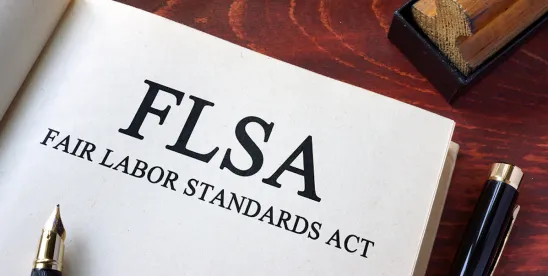On 23 April 2024, the US Department of Labor (DOL) announced a Final Rule raising the minimum salary and annual compensation thresholds to qualify for the executive, administrative, or professional (White Collar) exemptions from overtime under the Fair Labor Standards Act (FLSA). The Final Rule also increased the salary requirements for the highly compensated employee exemption (HCE Exemption). Under the Final Rule, an initial increase in salary thresholds will take effect on 1 July 2024, and a full increase to the thresholds takes effect on 1 January 2025. Further, the Final Rule introduces changes in the methodologies used to calculate and periodically update these salary thresholds to reflect current earnings data, which employers can expect to be applied every three years.
If the Final Rule becomes effective, employers will need to increase the salaries of any employee treated as exempt under the White Collar and HCE exemptions in order to maintain their exempt status. This Final Rule, however, is predicated on a methodology found invalid in 2016 (which is discussed in this K&L Gates alert) and is likely to face legal challenges.1
BRIEF OVERVIEW OF THE WHITE COLLAR AND HIGHLY COMPENSATED EXEMPTIONS
Under the FLSA,2 covered employers generally must pay employees a minimum wage and overtime pay of at least 1.5 times the employee’s regular rate of pay for hours worked over 40 hours in a given workweek.3 The FLSA carves out certain exemptions to the overtime rule based on an employee’s job duties and salary. One such exemption includes employees “employed in a bona fide executive, administrative, or professional capacity,”4 commonly known as the White Collar exemption. Those employees must (1) receive a salary that is equal to or greater than the salary threshold set by the DOL (currently $684 per week) and is not based on the amount of hours worked or quality of work performed; and (2) primarily perform executive, administrative, or professional duties as defined by the DOL.
Another exemption from the overtime rule is the HCE exemption. To qualify for that exemption, the employee must (1) be paid total annual compensation in excess of a set salary threshold (currently $107,432), which includes at least the minimum weekly basis of the White Collar exemption; (2) have a primary duty that includes performing office or nonmanual work; and (3) customarily and regularly perform at least one of the exempt duties or responsibilities outlined in the White Collar exemption.
WHAT DOES THE NEW RULE CHANGE?
The Final Rule significantly increases the salary and annual compensation thresholds to qualify for an exemption from overtime pay under the FLSA’s White Collar or HCE exemptions. However, it does not change the job duties requirements of the White Collar or HCE exemptions.
The Final Rule also revises the methodologies used to calculate these thresholds to include US Census salary data and, thus, reflect earnings growth, and requires that the thresholds be automatically adjusted using this methodology every three years. This is a significant change from prior rules, which allowed threshold increases only through formal rulemaking. Pursuant to the Final Rule, every three years, the DOL will consider the US Census salary data and update the salary thresholds.
Under the Final Rule, an initial increase to these thresholds will take place on 1 July 2024. The full increase calculated under the updated methodologies will take place on 1 January 2025.
The scheduled increases are as follows:
| Date | Salary Threshold for White Collar Exemption | Annual Compensation Threshold for Highly Compensated Employee Exemption |
| 1 July 2024 | US$43,888 per year (US$844 per week) | US$132,964 per year, which includes at least US$844 per week (paid on a salary or fee basis) |
| 1 January 2025 | US$58,656 per year (US$1,128 per week) | US$151,164 per year, which includes at least US$1,128 per week (paid on a salary or fee basis) |
| 1 July and every three years after | To be determined using revised methodologies as applied to earnings data available at such time | To be determined using revised methodologies as applied to earnings data available at such time |
LOOKING AHEAD
What should employers do to prepare? Employers should monitor the Final Rule so they are aware of any legal challenges or other developments that may impact the effective dates or terms of the Final Rule. At the same time, employers should analyze the compensation of their workforce to determine whether they need to increase exempt employees’ salaries so they do not forfeit their exempt status when the Final Rule takes effect, or alternatively, convert them to nonexempt employees. Employers should also ensure that they implement internal procedures so they may be in compliance prior to the automatic salary increases set forth in the Final Rule. If employers fail to take action to increase salaries in advance of the effective date, exempt employees may lose their exemption and be subject to the overtime and recordkeeping requirements of the FLSA. A failure to comply with these provisions can result in significant penalties under the FLSA as well as under state wage payment laws.
As covered employers navigate and adjust for these new salary and annual compensation thresholds and FLSA classification concerns, the firm's Labor, Employment, and Workplace Safety practice can assist with all aspects of preparing for and maintaining compliance under the Final Rule and the FLSA.
FOOTNOTES
1 See Amy L. Groff, et. al, Federal Judge Blocks DOL Overtime Rule Implementation, K&L GATES HUB (November 23, 2016), https://www.klgates.com/Federal-Judge-Blocks-DOL-Overtime-Rule-Implementation-11-23-2016.
2 While the Final Rule applies only to exemption requirements under federal law, many states, such as California and New York, have imposed different requirements for exemptions, including different salary thresholds. For example, effective 1 January 2024, employees in California must earn an annual salary of no less than US$66,560 to satisfy the salary threshold requirement.
3 Many states have overtime requirements that significantly differ from the FLSA.
4 29 U.S.C. § 213(a)(1).






 />i
/>i

